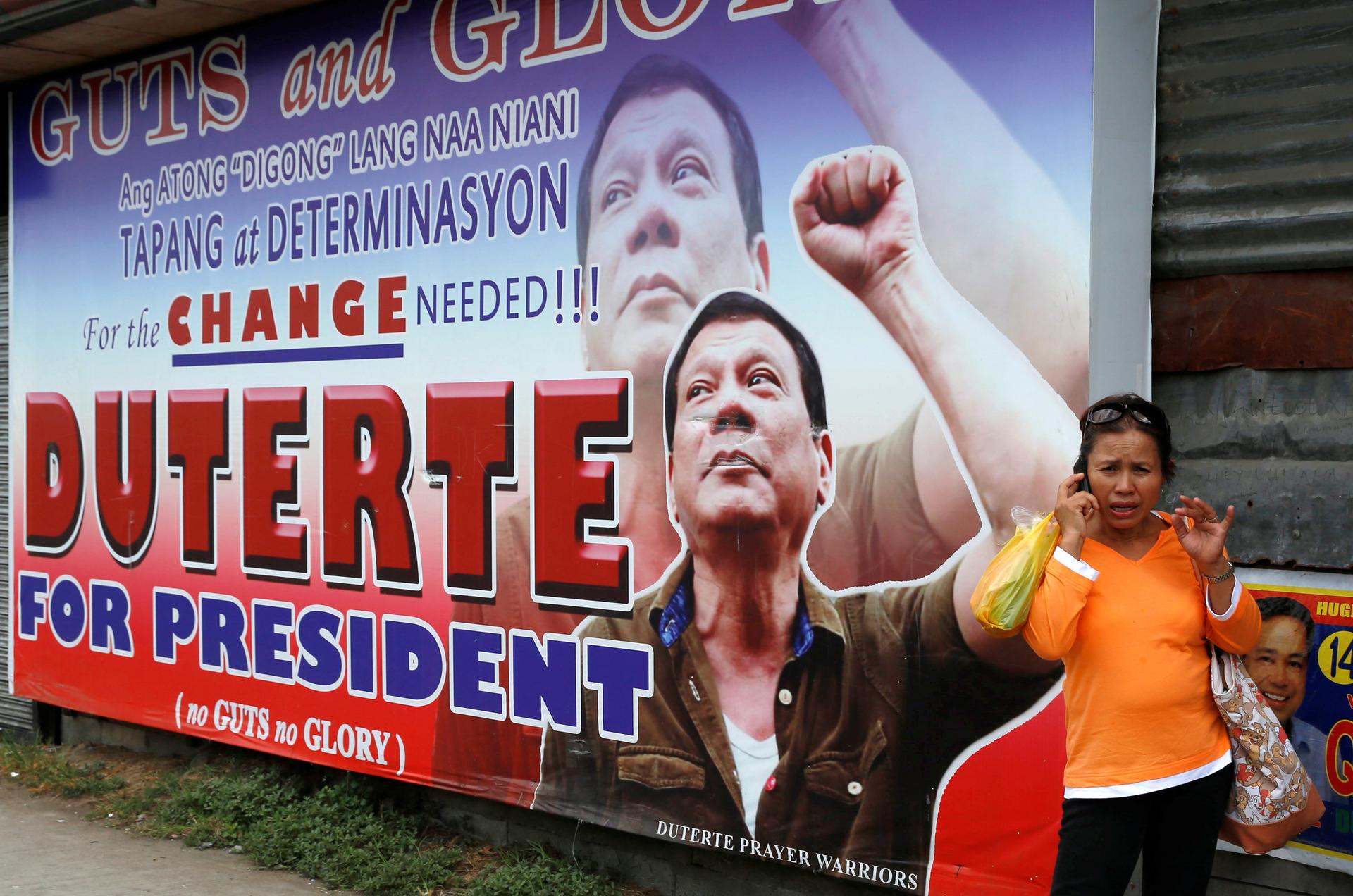The Philippines’ new president vows to ‘butcher’ criminals. Here’s his plan.
A woman talks on her phone beside a huge election campaign poster of president-elect Rodrigo "Digong" Duterte in Davao city, southern Philippines, May 11, 2016.
Criminals of the Philippines, you’ve been warned. The new president-elect wants to butcher you in public.
No, really. He actually said that.
And for those who fret over the rights of “drug pushers, hold-up men and do-nothings,” the incoming president promises a special viewing ceremony: “I will butcher [the criminals] in front of them if they want.”
Rodrigo Duterte is known by many names. The Punisher. Duterte Harry. And more recently, the Donald Trump of Asia.
The citizens of Davao, a bustling industrial hub in the southern Philippines, have long known him as their tough-talking mayor. Soon, the entire nation will call him president.
Duterte, 71, is the presumptive victor of the May 9 presidential election. Internationally, he has been reduced to caricature: a Trump-like, swaggering provocateur who wants to burn down the status quo.
Duterte actually dislikes the Trump comparison. “Donald Trump is a bigot,” he says. “I am not.” But the horrifically sexist jokes and references to his own penis don’t help.
Examined more closely, Duterte is harder to pin down. He is a devout Catholic who supports gay marriage. He’s known to tote a pistol but, since childhood, has slept with an old blanket received from his mom. Unlike Trump, he appears fond of Muslims and seeks peace with Islamist rebels in the southern Philippine jungles.
But Duterte’s ascent to the presidency was driven by a constant refrain: Elect me and I will hunt down and kill criminals en masse. Courts be damned. Screw human rights.
“I’ll dump all of you into Manila Bay,” he said, “and fatten all the fish there.”
This is Duterte’s promised purge by the numbers: 100,000 unspecified “criminals” killed. Corruption and crime — two of the biggest blights on Philippine society — somehow eradicated in just six months.
He has also suggested installing a nanny state seemingly designed to please the anxious parents of teenagers. His team has suggested a 10 pm curfew for unescorted minors. Add to that a nationwide ban on singing karaoke — a quintessential Filipino pastime — after 9 pm, and a post-1 am ban on public boozing.
But how could Duterte compel a national police force rife with dysfunction to cleanly enforce these rules? That’s not entirely clear.
“Stopping people from singing karaoke at 1 am won’t deal with poverty,” said Cristina Palabay, general secretary of Karapatan, a prominent human rights alliance. “And it won’t really stop criminality.”
Here are a few specifics. Duterte’s platform calls for hiking low-ranking police salaries from $315 to $2,000 per month — a measure to curb the desire to take bribes. He also wants thousands of cameras installed in government offices to catch bribe-taking officials. And, of course, the death penalty for drug trafficking and robbery.
“But the Philippine National Police won’t reverse course easily. There needs to be a total overhaul of their mindset,” Palabay said. “Remember that these institutions are born out of the martial law era.”
She is referring to the dictatorial US-backed Ferdinand Marcos regime, which fell in 1986 after two decades of obscene graft. During its reign, Filipinos toiled in poverty and lived in fear.
But today, Filipinos younger than 35 — the majority of the population — have scant memories of life under dictatorship. Many of those old enough to remember the regime fear youth may be too easily compelled by promises to fix disorder with an iron fist — which is exactly what Duterte is offering.
“There might be people seduced into favoring another authoritarian system,” said Walden Bello, a former member of the House of Representatives of the Philippines, in a recent interview with GlobalPost. “But we can’t just blame the youth for being ignorant. We have to blame the system for failing to deliver on so much democratic promise.”
Also: Two Trumps? Filipino Americans can vote in two (remarkably similar) elections this year
According to Palabay, the current administration “has done nothing to alleviate poverty and gross inequality in Philippine society. That’s how the Duterte camp won the election with these slogans.”
Those slogans include promises to make criminals “eat bullets” and impose the death penalty on officials guilty of “plunder.” This is crowd-pleasing rhetoric in the Philippines, where crime is up and the country ranks poorly on global corruption surveys.
Meanwhile, the Philippine press is sounding grim warnings about Duterte’s coming rule. According to Rappler, a Manila-based outlet: “If he wins, his dictatorship will not be thrust upon us. It will be one we will have chosen for ourselves … The streets will run red if Rodrigo Duterte keeps his promise.”
As for vows to mow down criminals and dump their corpses in the sea, a clear violation of Philippine law, Duterte hopes to grant himself the impunity he claims to disdain. His solution? “A pardon given to Rodridgo Duterte for the crime of multiple murder. Signed, Rodridgo Duterte.”
Perhaps Duterte will soften up once he takes power in late June. He has promised to dismiss with foul “banter” and “really behave” once he becomes president.
Indeed, shortly after claiming victory in the polls, Duterte let his machismo rest during a brief moment of reflection. The future president was filmed sobbing fitfully at his parents’ graves and asked their spirits for guidance.
He will certainly need it.
We want to hear your feedback so we can keep improving our website, theworld.org. Please fill out this quick survey and let us know your thoughts (your answers will be anonymous). Thanks for your time!
